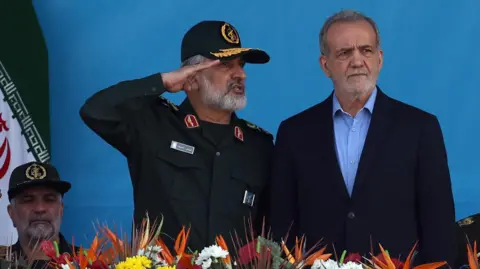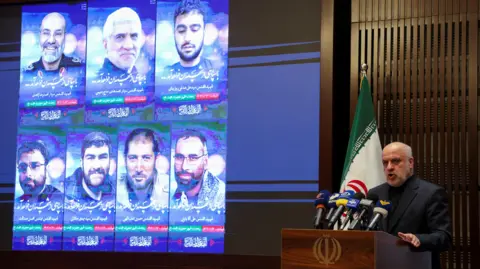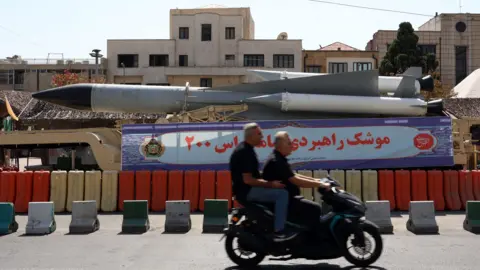Iran's dilemma over restraint or revenge for attacks on Hezbollah
EPA
President Masoud Pezeshkian (R) and Revolutionary Guards commanders have not yet threatened to retaliate for Israeli attacks on their ally, Hezbollah

Many hardline conservatives in Iran are growing uneasy about its lack of action as Israel targets the Lebanese armed group Hezbollah, their country’s closest and most long-standing ally.
When President Masoud Pezeshkian addressed the UN General Assembly on Tuesday, he criticised Israel’s war in Gaza and warned that its attacks on Lebanon could not go unanswered.
But Mr Pezeshkian, who was elected in July, adopted a more conciliatory tone than his hard-line predecessors, avoiding rhetoric about annihilating the Islamic Republic’s arch-enemy.
“We seek peace for all and have no intention of conflict with any country,” he stated.
He also expressed his government's readiness to resume nuclear talks with Western powers, saying: “We are ready to engage with participants of the 2015 nuclear deal.”
Other senior Iranian officials and commanders of the Islamic Revolution Guard Corps (IRGC) have also appeared to be unusually restrained when expressing their intentions to take revenge on Israel for its actions against their country and its key allies Hamas and Hezbollah.
Iran has armed, funded and trained both armed groups, but Tehran's leaders rely on Hezbollah to be a major deterrent preventing direct attacks on their country by Israel.

Iranian support has been critical to Hezbollah’s transformation into Lebanon’s most powerful armed force and political actor since the IRGC helped found the group in the 1980s.
It is the main supplier of the weapons that Hezbollah can deploy against Israel, particularly advanced missiles and drones, and the US has previously alleged that it also provides as much as $700m in funds annually.
Last week, Mojtaba Amani, Iran’s ambassador to Lebanon, was severely injured when his pager exploded last week at the embassy in Beirut. Thousands more pagers and walkie-talkies used by Hezbollah members also blew up in two attacks that killed a total of 39 people.
Iran blamed Israel, but it made no immediate public threats of retaliation.
In contrast, when Israel struck the Iranian consulate in Damascus in April, killing eight high-ranking IRGC Quds Force commanders, Iran swiftly responded by launching hundreds of drones and missiles at Israel.
Iran also vowed to retaliate after blaming Israel for the assassination of Hamas political leader Ismail Haniyeh in Tehran in late July, although it has not announced that it has taken any action yet.
Reuters

Iran’s ambassador to Lebanon, Mojtaba Amani - seen here at an event in April commemorating the Iranian commanders killed in an alleged Israeli air strike in Syria - was among thousands injured in last week's exploding pager attack
A former IRGC commander told the BBC that repeatedly threatening Israel without following through was further damaging the force’s credibility among its supporters inside Iran and its proxies abroad.
On Monday, President Pezeshkian told members of the US media in New York that Israel was seeking to draw Iran into a war.
“Iran is ready to defuse tensions with Israel and lay down arms if Israel does the same,” he insisted.
Some hardline conservatives close to Iran’s Supreme Leader, Ayatollah Ali Khamenei, criticised the president for talking about defusing tensions with Israel, asserting that he should recognize his position and avoid giving live interviews.
Mr Pezeshkian was due to hold a press conference in New York on Wednesday, but it was cancelled. It was unclear if he was forced to cancel because of his comments.
In Iran, power lies in the hands of Ayatollah Khamenei and the IRGC. They are the ones making the key strategic decisions, not the president.

It is notable that Ayatollah Khamenei also did not mention any plans for retaliation or issue threats toward Israel, which is quite unusual for him, when he addressed veterans on Wednesday.
EPA
Missiles are currently on public display in Tehran for Iran's Defence Week
Barak Ravid, an Israeli journalist at the US news site Axios, reported on Tuesday that two Israeli officials and Western diplomats had indicated that Hezbollah was urging Iran to come to its aid by attacking Israel. The Israeli officials claimed that Iran had told Hezbollah that “the timing isn’t right”, according to Ravid.
Last week, the host of the Iranian internet TV program Maydan, which is known to have ties to the IRGC, cited Iranian intelligence sources as claiming that Israel had also “carried out a special operation last month, killing IRGC members and stealing documents”.
He asserted that the Iranian press had been forbidden from reporting on the incident, which allegedly happened inside in Iran, and that the authorities were attempting to control the narrative.
In response, Tasnim News Agency, which also linked to the IRGC, denied the allegations.
The Islamic Republic finds itself in a precarious situation.
It is concerned that attacking Israel could provoke a US military response, dragging the country into a broader conflict.
With a crippled economy due to US sanctions and ongoing domestic unrest, a potential US strike against the IRGC could further weaken its the regime’s security apparatus, possibly emboldening the Iranian opponents to rise up once more.
However, if Iran refrains from direct intervening in Hezbollah’s conflict with Israel, it risks sending a signal to other allied militias in the region that, in times of crisis, the Islamic Republic may prioritize its own survival and interests over theirs.
This could weaken Iran’s influence and alliances across the region.





















































